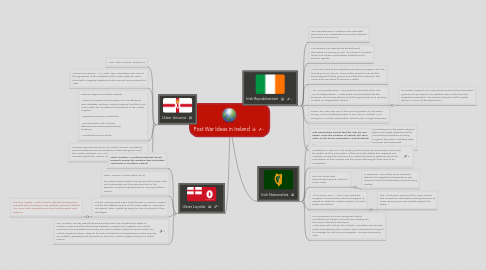Post War Ideas in Ireland
par Georgie Lawless


1. Ulster Unionist
1.1. 1906 Ulster Unionist Party forms
1.2. Colonel Saunderson → In March 1893, Saunderson was one of the signatories of the manifesto of the Ulster Defence Union, launched to organize resistance to the Second Home Rule Bill of 1893
1.3. Political, religious and ethnic Beliefs - Seeks to promote and strengthen the constitutional union between Northern Ireland, England, Scotland, and Wales within the constitutional framework of the United Kingdom - Opposes European Constitution - Pro-devolution with a strong attachment to British parliamentary traditions - Constitutional monarchist
1.4. Unionists opposed the home rule. Dublin unionist MP Edward Carson threatened armed resistance if Ulster was government from Dublin. Between 1912 and 1914, hundreds of thousands of Unionists signed the Solemn League and Covenant to this effect.
2. Ulster Loyalist
2.1. Ulster loyalism is a political ideology found primarily among the working class Protestant community in Northern Ireland.
2.2. Ulster Workers' Council Strike (1974) The strikers opposed the sharing of political power with Irish nationalists, and the proposed role for the Republic of Ireland's government in running Northern Ireland
2.3. Charles Harding Smith was a loyalist leader in Northern Ireland and the first effective leader of the Ulster Defence Association. He shaped Ulster Loyalist by bring the use of violence to their ideologies.
2.3.1. The term 'loyalist' is often used to describe working class unionists who are willing to use political violence to defend 'the Union' with Great Britain or who tacitly support such violence
2.4. The Troubles: The key issues that were evident were the constitutional status of Northern Ireland and the relationship between Unionists and Loyalists, who mostly come from the Protestant community, who want Northern Ireland to remain within the United Kingdoms ruling. However the Irish Nationalists and Republicans, where majority are Catholic, generally want the British to leave the United Kingdom and join a united Ireland.
3. Irish Republicanism
3.1. Irish Republicanism is extreme Irish nationalist who favours an independent 32 county, achieved by violence if necessary.
3.2. The Fenians (Irish Republican Brotherhood) attempted an uprising in 1867, but it was a complete failure and violent confrontation faded from the political agenda.
3.3. In the 20th Century the Republicanism saw a resurgence with the founding of Sinn Fein in 1905 and the revival of IRB. But the broad appeal of these groups was stifled amid optimism that Home Rule was about to become a reality.
3.4. "The Irish Republicanism Army fired the first shots of the Irish War of Independence." While Britain was distracted with the European war the Republicans took the opportunity of an uprising to strike an independent Ireland.
3.4.1. The Easter Rising of 1916 was poorly armed but took the British government by surprise.The rebellion was crushed and the ringleaders executed. This caused a dramatic shift in public opinion in favour of the republicans.
3.5. Eamon de Valera was one of the surviving leaders of the Easter Rising. He was elected president of Sinn Fein in October 1917, aiming for a unified independent Ireland under a single leadership.
3.6. Michael Collins first became known within Ireland for his involvement in the Easter Rising in 1916. He was a skilled organiser of considerable intelligence and highly respected by the Irish Republicans. During the War of Independence he ensured the avoidance of being targeted, with his soldiers who engaged in guerrilla war against the British. Suddenly when attacking, then just as quickly withdrawing, he minimised losses and maximised effectiveness.
4. Irish Nationalists
4.1. Irish Nationalism asserts that the Irish are one nation. Since the partition of Ireland, the term refers to the group supporting a united Ireland.
4.2. Plantations in 16th and 17th century Ireland, where the confiscation of land by the British and the colonisation of this land with settlers from England and Scotland. During this time period is caused the party to speak up about the colonisation of their country and the unjust reasoning for their land to be confiscated.
4.3. The Irish Penal Laws discriminated against Catholics. (1660–1693)
4.3.1. In response, many of the penal laws were relaxed, and legislative independence was achieved under the leadership of patriot Henry Grattan
4.4. Act of Union 1801 --> twin Acts united the Kingdom of Great Britain and the Kingdom of Ireland to create the United Kingdom of Great Britain and Ireland.
4.4.1. The Act of Union was one of the major events that caused the Nationalist's and Republican's to cause uprising and mass protests against the British.
